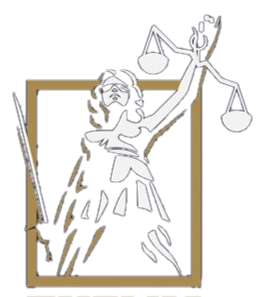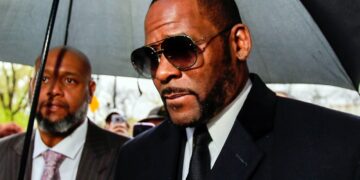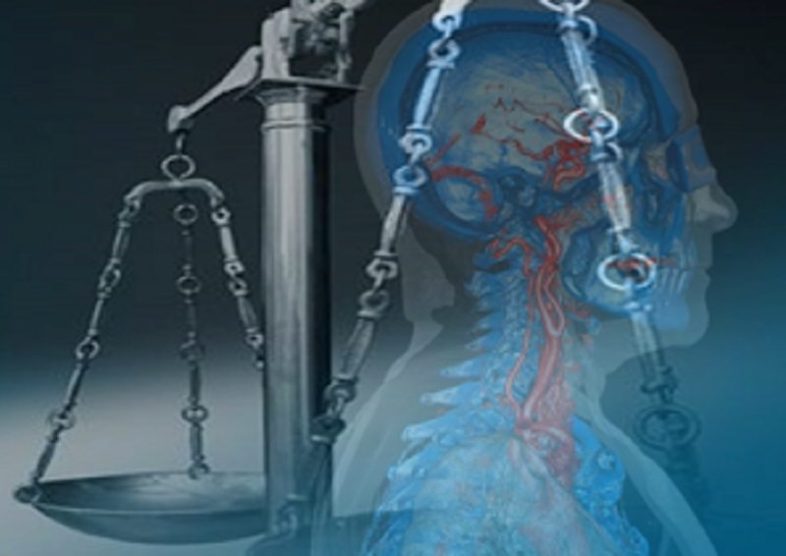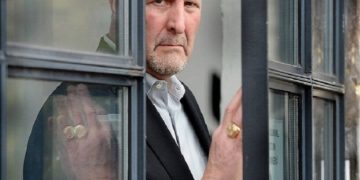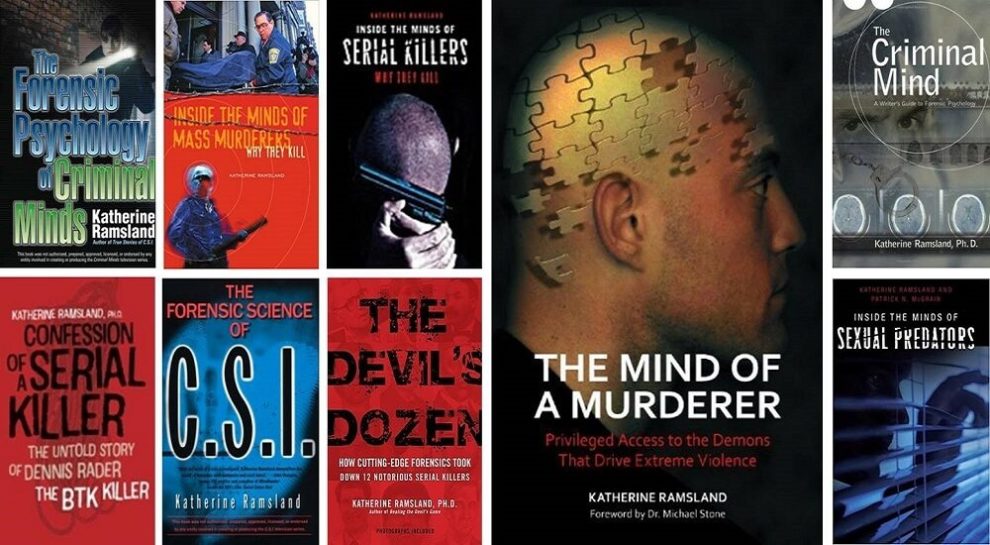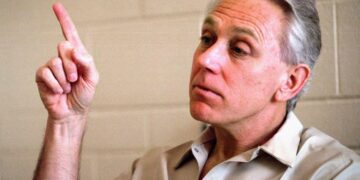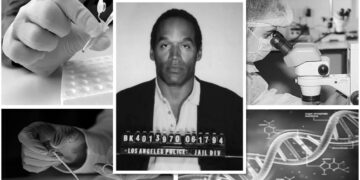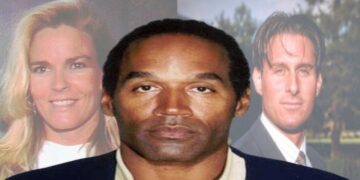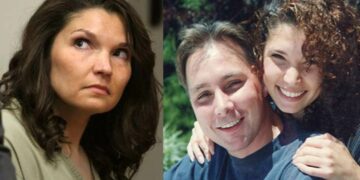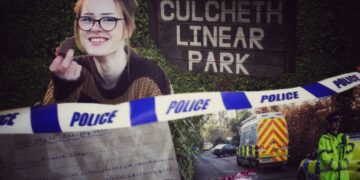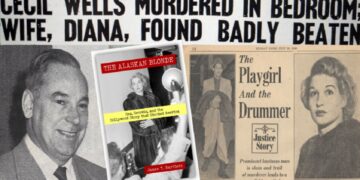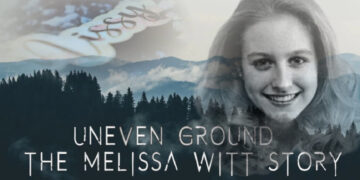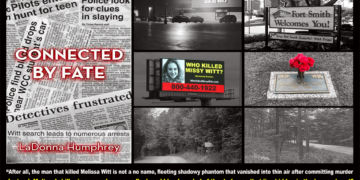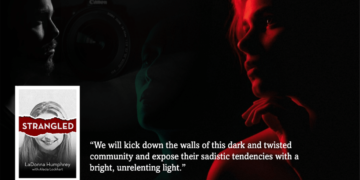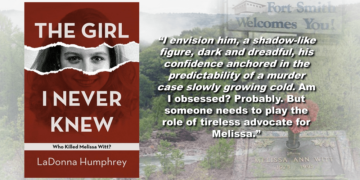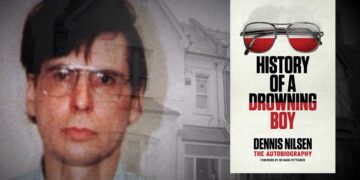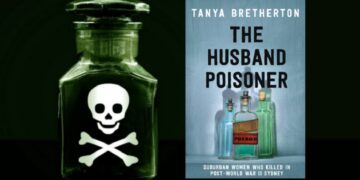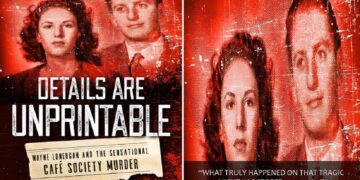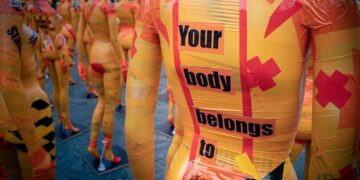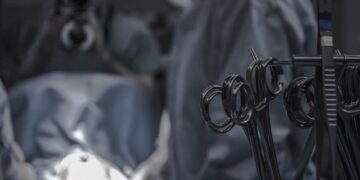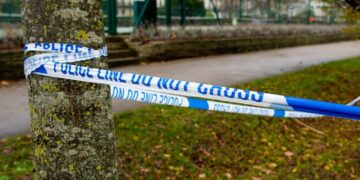By Joe Koenig.
What’s a good denial? A “good” denial is a truthful statement that helps close the door on the allegation. Notice I didn’t say it “closes the door” – it “helps” close the door. Evidence ultimately determines the truth. We can rely on a good denial. It helps disprove the allegation. It isn’t, by itself, proof beyond a reasonable doubt, but it does offer evidence the allegation is false.
A good denial must be truthful. In the criminal setting, “I am not guilty,” is considered a quasi-good denial. By “quasi” I mean it is a good denial in this very specific setting. It’s “truthful” since all those arrested are, in fact, “not guilty” until proven guilty beyond a reasonable doubt. Even if the subject did the act, he is telling the truth with this statement. Likewise, the denial “I am innocent” is truthful in the criminal setting for the same reasons. Both are quasi-good denials even if they did that of which they’re accused – but those denials offer little to close the door on the allegation. The terms “not guilty” and “innocent” are mutually understood in the criminal setting.
Those terms “not guilty” and “innocent” outside the court systems are not universally understood. Outside the court systems (criminal and civil) there is no need to prove beyond a reasonable doubt or with a preponderance of evidence. Therefore, these denials are not so good when used in non-court settings. So, when the wife accuses a husband of infidelity, his “I am innocent,” isn’t a good denial. The term, “innocent” lacks specificity and is subject to many interpretations outside the court setting.
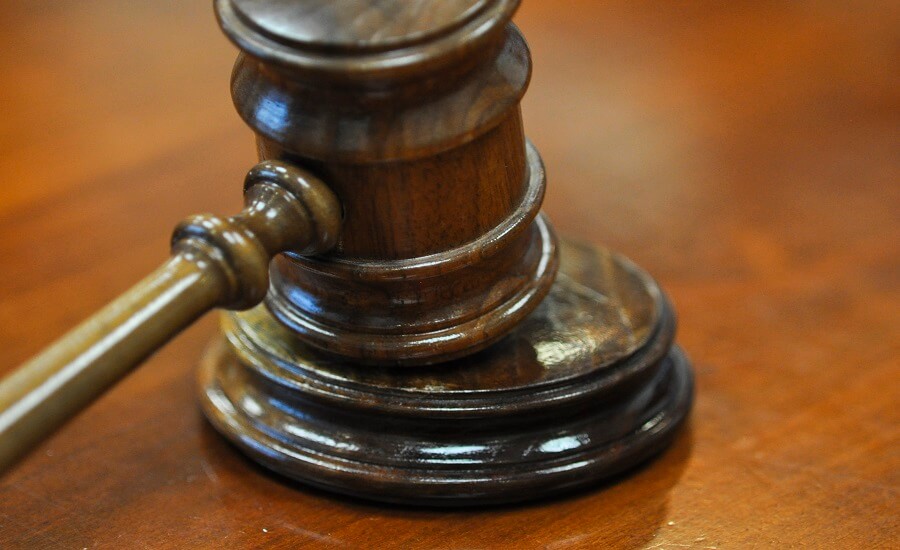
A good denial is direct, simple and succinct. It clearly denies the allegation. It uses only those words necessary. All words in the denial must be mutually understood by all and the statement must stand-alone. By “stand alone” I mean it cannot be qualified by what is stated before or after the denial. “I didn’t do it,” and “I did not do it” are good denials when “it” is mutually understood by all and there is no doubt as to what “it” is. “Let’s say, I didn’t do it,” is thus not a good denial because of the qualifier, “Let’s say, …” Anybody can “say” anything.
Further, let’s say a person takes $621.31 from a grocery store cash register. The owner, suspecting that $650 is missing, improperly asks the suspect, “Did you take the $650? The suspect answers, “I didn’t take it,” knowing that he didn’t take $650. The “it” is not mutually understood by all. Deceptive people take advantage of poorly worded questions and provide partial truths that, on the surface, appear to be complete truths.
A poor denial, on the other hand, helps keep the allegation alive. A poor denial is a lost opportunity and offers evidence the allegation is true. If there are several allegations and the accused provides a good denial to one of the allegations but is silent on the others, the silence on the others is evidence the others may be true. When a suspect is accused of 3 larcenies and offers a good denial on just one, he just provided evidence he may have committed the other two. Poor denials usually hold some degree of truth, a partial truth. Partial truths are misleading and considered lies.
People want to tell the truth. Quoting from my book, “Getting the Truth:”
“Like water seeking its own level, the body relieves itself of stress, seeking calmness. The greatest stress reliever known to man is truth-telling. It’s a relief valve, a bloodletting, a purging. Nature demands it in order to begin the rebuilding process.”
Take a look at these famous “Rogues Gallery” of stand-alone denials. Can you identify the good denials? Hint – there is but one.
1. “I unequivocally and without any reservations totally deny all the allegations about sexual contact.” Alan Dershowicz, 2015
2. “I am absolutely, 100% not guilty.” OJ Simpson (at his arraignment)
3. “She was not choked. She was not punched.” Pastor Dollar 6/10/12
4. “I could never hurt Susan or my sons.” Josh Powell
5. “I’ve said it for 7 years – I haven’t doped” Lance Armstrong
6. “I’m not a murderer.” Amanda Knox 4/30/2013
7. “I have never sexually harassed anyone, let’s say that, …..” Herman Cain, 2011
8. “I’m very comfortable saying nobody did it as far as I know.” Tom Brady 2015
9. “I barely knew the man and why would I kill him?” John McAfee 2012
10. “In my heart, I know I did not do these alleged disgusting acts.” Jerry Sandusky 2012
11. “As far as the allegations of CIA hacking into Senate computers — nothing could be further from the truth.” CIA Director John Brennan 2014
12. “Anyone who knows me, or who worked with me, would know that I wouldn’t, and more importantly that I didn’t, do anything to damage the Milly Dowler investigation.” Andy Coulson 2012
All but one of these are poor denials. Here’s why:
1. “I unequivocally and without any reservations totally deny all the allegations about sexual contact,” he said.” Alan Dershowicz 2015
This is a denial statement, not a denial. He doesn’t tell us he didn’t do it. He is simply issuing a denial statement. A denial for Mr. Dershowicz would look something like, “I didn’t have sexual contact with the accuser.” Be careful with denial statements. Saying, “I deny …..” is not the same as “I didn’t do it.” Denial statements are not denials.
2. “I am absolutely, 100% not guilty.” OJ Simpson (at his arraignment on the criminal charges of murder).
This is a good denial (albeit quasi-good). He is 100% not guilty at this point in the criminal justice system – all accused are not guilty until proven guilty beyond a reasonable doubt.
3. “She was not choked. She was not punched.” Pastor Dollar 6/10/12
Pastor Dollar doesn’t say who didn’t choke her or who didn’t punch her. A good denial would have been, “I didn’t choke her. I didn’t punch her.” Since he did not, this is not a good denial.
4. “I could never hurt Susan or my sons.” Josh Powell
“I could never …” is a statement about the future, not the past.
5. “I’ve said it for 7 years – I haven’t doped” Lance Armstrong
He’s simply saying he said it, which he did. He doesn’t simply say, “I haven’t doped.” The introduction makes this a poor denial.
6. “I’m not a murderer.” Amanda Knox 4/30/2013
The word “murderer” is subject to many interpretations. Therefore, it is not “mutually understood.” Does “murderer” mean someone convicted by what she feels was an improper forum? I think not. While this may well be a truthful denial, because of the possibly misunderstood word we cannot rely on it.
7. “I have never sexually harassed anyone, let’s say that, …..” Herman Cain, 2011
The trailing introduction, one I call a retroactive introduction, “….. let’s say that ..” makes this a poor denial. When we see “I can tell you this …,” or “I feel comfortable telling you this ..,” or “I can say ..,” we cannot rely on what follows. Since they are stating what they are telling us they will tell us, they’re telling the truth.
8. “I’m very comfortable saying nobody did it as far as I know.” Tom Brady 2015
Again, “saying …” is a giveaway. He could have said, “Nobody did it,” without any qualifiers. The fact he didn’t makes this a poor denial. An additional qualifier is the, “ … as far as I know.”
9. “I barely knew the man and why would I kill him?” John McAfee 2012
He never denies killing the man. He could have said, “I didn’t kill him.”
10. “In my heart, I know I did not do these alleged disgusting acts.” Jerry Sandusky 2012
Look at all the qualifiers, “In my heart, …” and, “..I know.” These qualifiers make this a poor denial. He could have simply said, “I did not do these alleged disgusting acts.”
11. “As far as the allegations of CIA hacking into Senate computers — nothing could be further from the truth.” CIA Director John Brennan 2014
The CIA Director never denied the allegation of hacking into the Senate computers. About a month later, he issued an apology: “The Director subsequently informed the SSCI Chairman and Vice Chairman of the findings and apologized to them for such actions by CIA officers as described in the OIG report.”
12. “Anyone who knows me, or who worked with me, would know that I wouldn’t, and more importantly that I didn’t, do anything to damage the Milly Dowler investigation.” Andy Coulson 2012
Because of all the qualifiers,“ ..knows me ..,” “…would know ..,” “… that I wouldn’t,” this is a poor denial. The good denial would be, “I didn’t do anything to damage the Milly Dowler investigation.”
Poor denials are structured by the deceptive to lead you to believe they are saying one thing, when, in fact, they are on the record saying something else. Mr. Dershowicz wants you to believe he did not have sexual contact with the accuser without saying it. The same applies to all the rest, Pastor Dollar, Lance Armstrong, Herman Cain, etc.
When getting the truth, one needs to look both at what is said and isn’t. Both are important, but what isn’t said can be most important. You can often identify poor denials by what isn’t said. Let’s look at Toronto Mayor Rob Ford’s denial in 2013:
“I do not use crack cocaine, nor am I an addict of crack cocaine.” Notice this is the present tense, not the past tense. Present tense is only a snapshot, a millisecond. He says nothing about the past, which tells the whole story.
Let’s look at this denial. This was in a written statement from 1 of 10 tellers who were all suspects in an investigation into missing money. Is this a good denial?
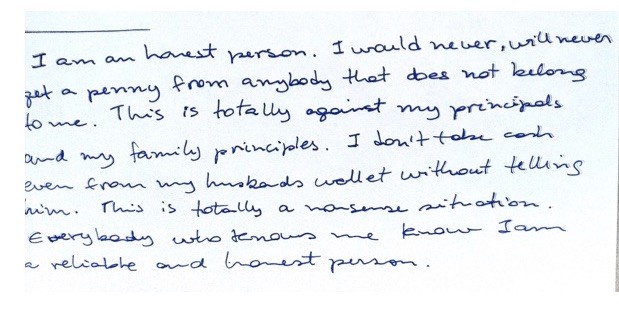
No. Notice she doesn’t deny she took the money. If they don’t deny it, they probably did it. The absence of a denial can be evidence the allegation is true. Truthful people want to tell the truth – will tell the truth. A truthful denial will be simple, direct, and precise. There will be no misunderstood words and it will stand-alone.
Good denials use the pronoun “I.” The denial, “I didn’t do it,” is a good denial on its face (only if we all know what “it” is). The pronoun “I” requires unique, personal accountability, and responsibility. No one else did the act when “I” is used. So, look for the “I” in a good denial. Just because the “I” is used, however, doesn’t make it a good one. Just look at Mayor Ford’s poor denial for example.

Let’s look closer at the Andy Coulson denial to provide further context for analyzing his denial. In 2012, the British Government accused Andy Coulson and Rebeka Brooks of phone hacking while both worked for the “News of World,” a publication owned by Robert Murdock. Prime Minister David Cameron had hired Coulson as his Director of Communications following Coulson’s stint as editor of “News of the World.” Let’s look at Coulson’s denial as provided by The Guardian on 7/24/2012:
Coulson gave a short statement outside his south London home, saying he would “fight these allegations”, and added that he never had done anything to harm the Milly Dowler investigation.
He said: “I am extremely disappointed by the CPS decision today. I will fight these allegations when they eventually get to court. Anyone who knows me, or who worked with me, would know that I wouldn’t, and more importantly that I didn’t, do anything to damage the Milly Dowler investigation. At the News of the World, we worked on behalf of the victims of crime, particularly violent crime, and the idea that I would sit in my office dreaming up schemes to undermine investigations is simply untrue.”
Is this a good denial? Again, no. In short, he never tells us he didn’t do it. Instead he says, “Anyone who knows me, or worked with me, ..would know that I wouldn’t, and more importantly that I didn’t …” This sounds eerily similar to CIA Director John Brennan’s denial. Are you seeing some patterns?
And further, good denials often have a contraction. Lying is more stressful than telling the truth. I, therefore, look for contractions in good denials because the contraction can be (notice can be) an indication of less formality, less stress. So, the denial, “I did not do it,” is good, but not as good as, “I didn’t do it.” Be careful, though, there are no absolute rules.
Good denials are simple, specific, and direct, contain only mutually understood words, use the personal pronoun “I,” and clearly deny the allegation. Good denials stand-alone. They are simple and void of unnecessary words. The truthful person simply wants to tell the truth. That’s why, “I didn’t do it,” as long as everyone knows exactly what “it” is, typically is a good denial. As always, we never rely solely on the denial – we want to accumulate all the evidence necessary to prove or disprove the allegation. A good denial is evidence the allegation is not true.
The deceptive person wants you to believe they are telling you the complete truth. Their objective is to get you to believe one thing, while on the record saying something else. They will give you partial truths to make you believe you are receiving the complete truth. Poor denials often look good on the surface but don’t hold up to the tests of a good denial. Remember Lance Armstrong’s denial, “I’ve said it for 7 years – I haven’t doped.”
It takes practice and knowledge to be able to consistently identify good denials. Reading this article is a good first step. Learn these principles and you’re well on your way to becoming a better investigator, a better executive, a better decision-maker.
This article was originally published in the Association of Fraud Examiners (ACFE) Jan/Feb 2018 Fraud Magazine.
- Associated Press (Jan. 22, 2015) “Tom Brady says he doesn’t know how footballs became underinflated” Chicago Tribune. Retrieved from: tinyurl.com/yalca2jt
- Beasley, D., Reuters (Jan. 25, 2013) “Creflo Dollar Abuse Charge Dropped After Pastor Seeks Anger Management” Huffpost. Updated March 27, 2013. Retrieved from: tinyurl.com/ybdmsr4u
- Boren, C (Oct. 9, 2012) “Jerry Sandusky: ‘I know I did not do these alleged disgusting acts’ The Washington Post. Retrieved from: tinyurl.com/ya39b8bj
- CBS News (Aug. 25, 2011) “Susan Powell’s husband: I could never hurt her” Retrieved from: tinyurl.com/yau9r7d7
- CBS News (Jan. 14, 2013) “Lance Armstrong: Ready to come clean on doping?” Retrieved from: tinyurl.com/y77ugugt
- CBSN (June 11, 2014) “OJ Simpson pleads not guilty to murder charges” YouTube. Retrieved from: tinyurl.com/y9qet4qr
- Fletcher, L., and Netter, S (Dec. 16, 2009) “Husband Named Person of Interest in Susan Powell Disappearance” ABC News. Retrieved from: tinyurl.com/yzk3e7j
- Henderson, N (Oct. 31, 2011) “Cain: ‘I have never sexually harassed anyone,’ The Washington Post. Retrieved from: tinyurl.com/yaab9q23
- Izadi, E., and Holley, P (March 28, 2015) “Following acquittal, tearful Amanda Knox says she is ‘incredibly grateful’ The Washington Post. Retrieved from: tinyurl.com/ybnv6tcn
- Lat, D (April 7, 2015) “Allegations Against Alan Dershowitz, Removed From The Record” Above the Law, tinyurl.com/ybawklfq
- Leonard, E (April 27, 2013) “Amanda Knox on Reclaiming Her Identity: ‘I Am Not a Murderer’ People. Retrieved from: tinyurl. com/ybs5ozrm
- News 5 (Sept. 26, 2016) “A Look at the ‘Dangerous Life of John McAfee’ Retrieved from: tinyurl.com/y8ozwo9k
- O’Donnell, K, Associated Press (July 31, 2014) “CIA Director Brennan Apologizes to Senate Leaders for Computer ‘Hack’ NBC News. Retrieved from: tinyurl.com/yd36hpgn
- PA/The Huffington Post (July 24, 2012) “Rebekah Brooks and Andy Coulson ‘Distressed’ By Milly Dowler Phone Hacking Charge” Huffpost UK edition. Retrieved from: tinyurl.com/yap8gx2a
- TOI staff and AFP (Jan. 4, 2015) “Dershowitz threatens to sue accuser in sex claim” The Times of Israel. Retrieved from: tinyurl.com/ycftygvv
Koenig, J. (2019, Jun 15) The Anatomy of Denials. Crime Traveller. Retrieved from https://www.crimetraveller.org/2019/06/anatomy-of-denials/
About the Author: Joe is the Author of the award-winning book “Getting the Truth” (2014) and “Getting the Truth: I Am D.B. Cooper”(2019). He is a Professional Investigator in Michigan, a Certified Fraud Examiner and Forensic Linguist. In addition to his work on the D.B. Cooper case, he was lead investigator on the James R. Hoffa case. He holds a BS in Accounting from Wayne State University, a Masters in Public Administration from Eastern Michigan University where he was a member of the Phi Kappa Phi Honor Society.
Books by Joe Koenig:
-
Getting The Truth An award-winning book on Forensic Linguistics about reading between the lines, distinguishing truth from deception, and learning to sculpt your questions to get the truth.
-
Getting The Truth: I Am D.B. Cooper The new book by Forensic Linguist Joe Koenig evaluates the confessions of Walter Reca, claiming to be the man who successfully hijacked a Boeing 727 in 1971 and skydived out of the plane with $200,000 in cash. [Read Crime Traveller’s Review]

